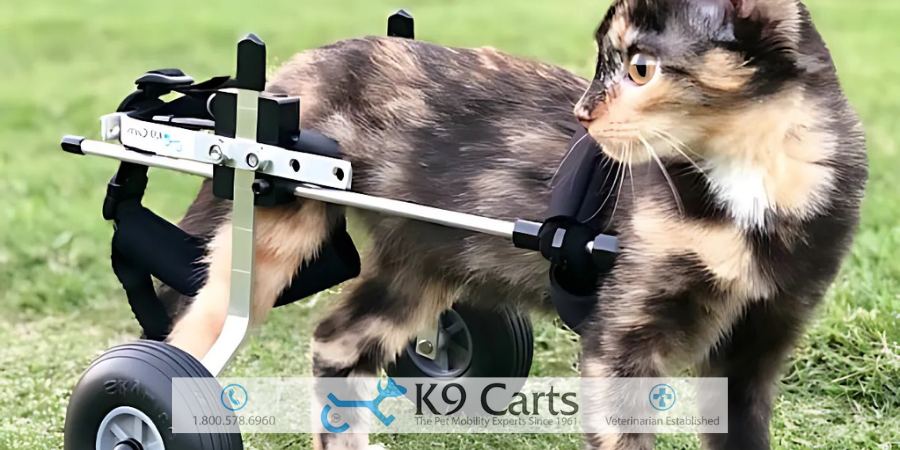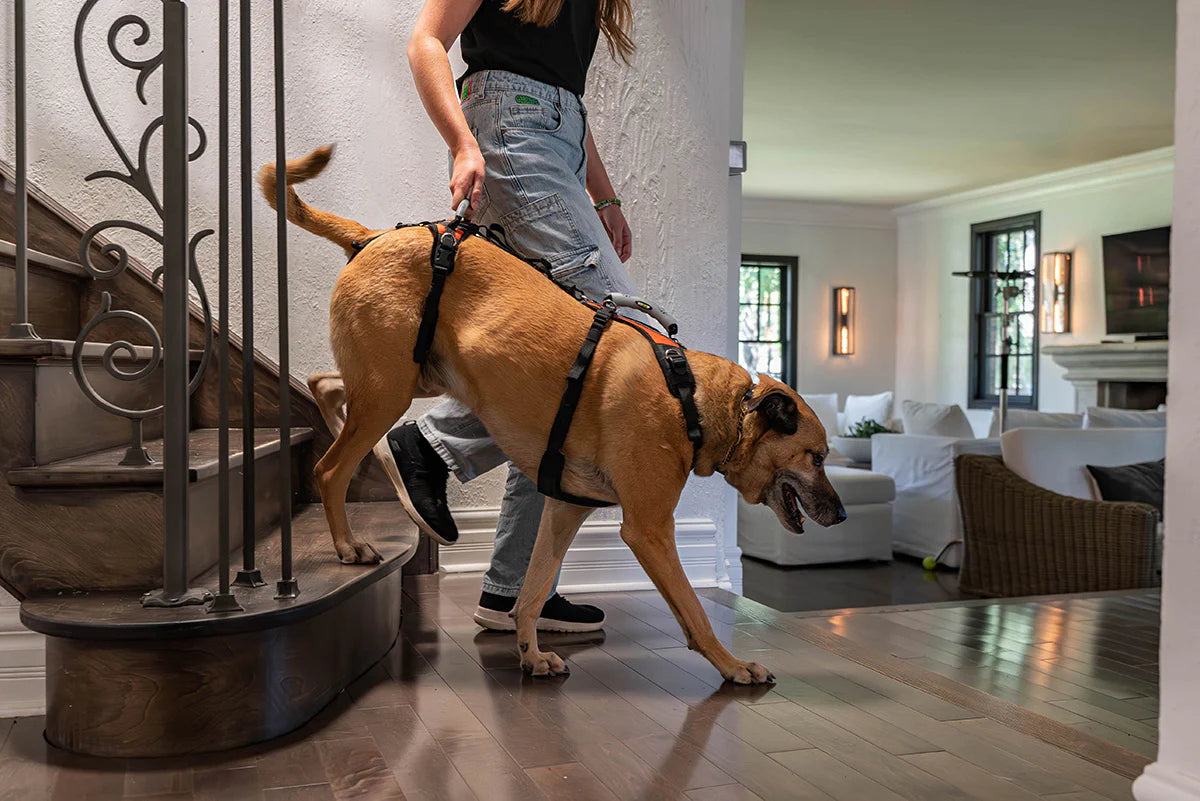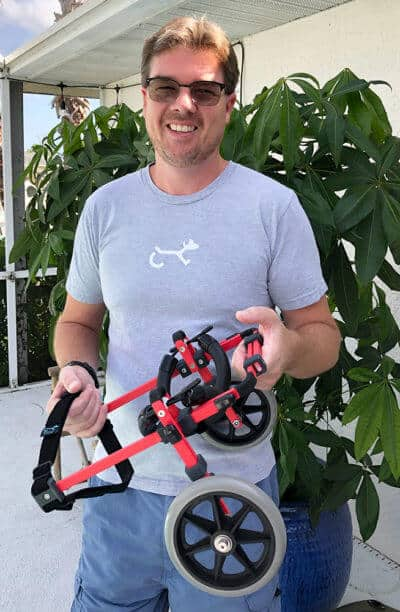Kitten Wheelchairs: How K9 Carts’ Wheels Are Changing Lives for Disabled Kittens

Kittens are known for their boundless energy and playfulness, but for some, this liveliness is hindered by mobility issues. Whether due to congenital conditions, accidents, or illness, disabled kittens often face significant challenges in moving freely and living a high-quality life.
Enter K9 Carts, a company renowned for crafting custom-built mobility solutions for pets, including specialized wheelchairs that help disabled kittens regain their ability to move. This page explores how K9 Carts' wheelchairs are not only improving the lives of these tiny, vulnerable creatures but are also setting a new standard for care and mobility assistance.
Understanding Kitten Mobility Challenges
Kittens can face mobility issues for a variety of reasons, including genetic deformities, traumatic injuries, neurological disorders, or infections that damage the spinal cord. Some kittens are born with conditions like cerebellar hypoplasia, which affects their coordination and motor skills, while others might develop paralysis due to accidents or illnesses. For these kittens, the lack of mobility can lead to frustration, pain, and the inability to participate in typical kitten activities such as playing or exploring.
Kittens with mobility impairments require special attention, particularly in their early stages of development. If left unassisted, they may develop secondary issues such as muscle atrophy, joint stiffness, or pressure sores from dragging their hind limbs. This is where specialized wheelchairs, such as those from K9 Carts, come into play, providing a solution to help these kittens regain mobility and prevent further complications.
How K9 Carts’ Wheelchairs Are Designed for Kittens
At K9 Carts, we have extensive experience in crafting custom-built wheelchairs for animals, and our designs are particularly well-suited for kittens. Each cat wheelchair is lightweight, adjustable, and designed to accommodate the specific needs of a small, growing animal. The design philosophy centers around comfort, durability, and ease of use.
1. Lightweight and Adjustable Frames
Kittens are small, delicate creatures, and any mobility device must be both lightweight and properly sized to prevent further injury. K9 Carts’ kitten wheelchairs are crafted using durable yet lightweight materials such as aluminum, ensuring that the chair doesn’t place undue strain on the kitten. The wheelchairs are also adjustable, allowing for changes as the kitten grows, which is critical during the early months of rapid development.
2. Custom-Fit for Comfort
K9 Carts’ wheelchairs are custom-built to match the specific dimensions and needs of each kitten. This ensures that the device fits perfectly, reducing the risk of rubbing, pressure sores, or discomfort. The harness system, which holds the kitten in place, is designed with soft padding to provide support without chafing sensitive skin or fur. The design also allows for easy adjustments as the kitten moves, ensuring that they remain comfortable throughout use.
3. Rear Support or Full Support Options
Depending on the nature of the kitten's mobility issue, K9 Carts offers both rear support wheelchairs (for kittens with hind limb paralysis) and full support wheelchairs (for those with both front and rear limb paralysis).
The rear support option lifts the hindquarters, allowing the kitten to use its front legs to propel itself, while the full support option provides assistance for both the front and back limbs. These variations ensure that regardless of the nature of the disability, a suitable wheelchair option is available.
Discover K9 Carts’ wheelchairs for cats here.
The Impact of Wheelchairs on Kitten Health and Quality of Life
Providing a disabled kitten with a wheelchair can have a profound impact on their physical and emotional well-being. Mobility is essential for a kitten’s development, and without it, they can quickly become frustrated, lose muscle tone, and develop depression. K9 Carts’ wheelchairs help counteract these problems in several key ways.
1. Improved Physical Health
Using a wheelchair prevents muscle atrophy by allowing the kitten to engage its muscles and practice a range of movements. Regular use of the wheelchair helps maintain circulation, flexibility, and muscle tone, which are crucial for the overall health of a growing kitten. Additionally, by lifting the kitten’s hindquarters off the ground, the wheelchair prevents friction wounds that can result from dragging their limbs on the floor. This not only reduces pain but also minimizes the need for additional medical interventions.
2. Enhanced Mental Well-Being
Like all young animals, kittens thrive on exploration and play. Being immobilized can lead to frustration, anxiety, and depression, especially for active kittens. With the assistance of a wheelchair, these kittens can return to a more normal lifestyle. They can move independently, play with toys, explore their surroundings, and interact with other animals. This mental stimulation is vital for their emotional health, helping them remain engaged, happy, and curious despite their physical limitations.
3. Socialization and Integration
Disabled kittens often find it difficult to integrate into normal social interactions with other pets. Their inability to move as freely as their littermates or other animals can lead to isolation. Wheelchairs enable these kittens to participate in social play, which is essential for their emotional development and socialization. With the help of a K9 Carts wheelchair, disabled kittens can more easily join in with other pets, fostering a sense of belonging and reducing the emotional toll of isolation.
Caring for a Kitten in a Wheelchair
Caring for a kitten in a wheelchair requires some special considerations to ensure that the kitten remains healthy and comfortable while using the device. Owners need to regularly check the fit of the wheelchair and make adjustments as needed. As kittens grow quickly, periodic re-sizing of the wheelchair components is essential.
1. Daily Monitoring and Adjustments
The wheelchair should be checked daily for signs of wear and tear, and adjustments should be made to the harness or frame to ensure a proper fit. It's important to observe how the kitten moves in the wheelchair and make modifications if the kitten shows any signs of discomfort or difficulty.
2. Skin Care and Hygiene
Since the wheelchair involves contact with the kitten’s body, owners must regularly inspect the kitten’s skin for signs of irritation or pressure sores. A well-fitted wheelchair should not cause any skin problems, but in case of issues, padding can be adjusted, or soft protective coverings can be used. Keeping the kitten clean and dry, especially around the area where the harness fits, is also essential to prevent skin infections.
3. Exercise and Play
Kittens in wheelchairs still need plenty of opportunities to exercise and play. Caretakers should provide toys, interactive games, and safe spaces where the kitten can explore freely in its wheelchair. Regular movement helps maintain muscle strength and provides essential mental stimulation.
How to Get a Kitten Wheelchair from K9 Carts
For pet owners considering a wheelchair for their disabled kitten, the process of obtaining one from K9 Carts is simple and straightforward. K9 Carts offers a custom ordering process, where owners provide detailed measurements of their kitten to ensure the best fit. If you're unsure about how to take these measurements, K9 Carts provides comprehensive guidance and customer support to assist you.
Once the measurements are submitted, K9 Carts custom-builds the wheelchair to suit the kitten’s needs. The turnaround time is quick, ensuring that the kitten receives the wheelchair as soon as possible. After receiving the wheelchair, owners can rely on K9 Carts for ongoing support, advice on adjustments, and care tips to ensure the wheelchair continues to meet the kitten’s needs as it grows.
Kitten Wheelchairs: A New Life for Disabled Kittens
The introduction of K9 Carts’ custom-built wheelchairs into the lives of disabled kittens has transformed the way mobility issues are addressed. By offering mobility solutions that cater specifically to the needs of small, growing animals, K9 Carts provides a lifeline to kittens that would otherwise struggle to lead a fulfilling life. Through improved physical health, enhanced mental well-being, and increased socialization opportunities, K9 Carts is helping these kittens live more active, happier lives.
With the right wheelchair, disabled kittens can regain their independence and experience the joy of movement again—proving that, despite their challenges, they can still live life to the fullest.
Frequently Asked Questions
What is a Kitten Wheelchair?
A kitten wheelchair is a custom-built mobility device designed to support kittens with mobility impairments, allowing them to move more freely. These wheelchairs provide support for kittens that suffer from paralysis or weakness in their limbs, giving them the ability to explore their environment and engage in activities like play. K9 Carts specializes in creating lightweight, adjustable wheelchairs that are tailored to the specific needs and size of each kitten.
How Does a Kitten Wheelchair Work?
A kitten wheelchair typically provides support for the hind limbs (in rear support models) or all four limbs (in full support models), allowing the kitten to move using its unaffected limbs. The wheelchair has a harness to keep the kitten secure and wheels that make movement easier.
Can Kittens Grow with Their Wheelchairs?
Yes, K9 Carts wheelchairs are designed to be adjustable, so they can be resized as the kitten grows. The adjustable features ensure a proper fit as the kitten matures, avoiding discomfort and the need for a completely new wheelchair.
Are Wheelchairs Only for Paralyzed Kittens?
No, wheelchairs are not limited to paralyzed kittens. Kittens suffering from conditions such as cerebellar hypoplasia, hip dysplasia, or severe feline arthritis can also benefit from wheelchairs, as they help reduce strain on affected limbs while still allowing the kitten to move around.
How Long Does It Take for a Kitten to Adapt to a Wheelchair?
Most kittens adapt quickly to using a wheelchair, especially if they start at a young age. However, the time it takes can vary depending on the kitten’s personality and the nature of their disability. With consistent encouragement and a comfortable fit, most kittens adjust within a few days to weeks.








